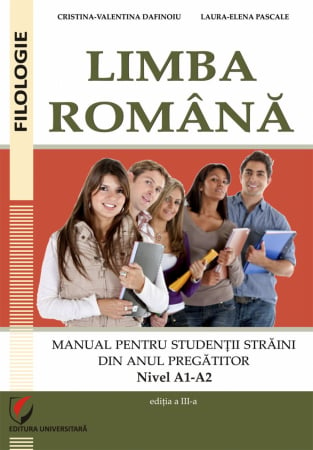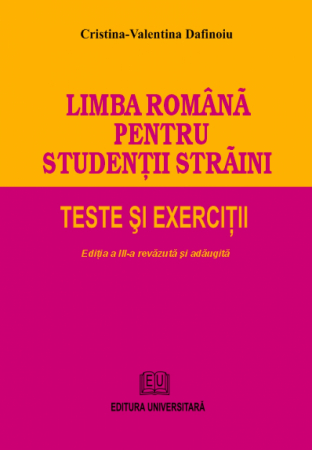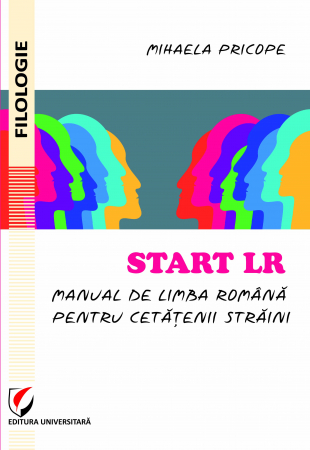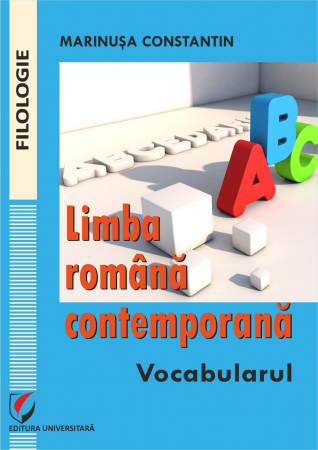ISBN: 978-606-28-0083-3
DOI: 10.5682/9786062800833
Publisher year: 2014
Edition: I
Pages: 204
Publisher: Editura Universitara
Author: Anca Teodora Serban-Oprescu
- Download (1)
- More details
- Content
- Authors
- Reviews (0)
-
CULTURAL PARAMETERS OF 21st CENTURY AMERICAN CHALLENGES: OPPORTUNITIES AND DISCONTENTS
Download
The present work is a study trying to grapple with and answer questions revolving around globalization, the end of the nation-state, global diasporas, new modernities, state and foreign politics, cultural politics, contemporary manifestations of the space geographically inscribed as United States of America.
Randomly selecting, concepts like multiculturalism, ethnicity, discrimination, power, freedom, terrorism, community are highlighted topics in the academic and narrative accounts of America of our times and massively habitual to the public discourse. These have become emblematic for this country, for its image in the world and for how we ‘see’ America.
The book represents a Romanian perspective on the American phenomenon, trying to capture the complexity of a reality which sparked controversy and generated strong opinions among sociologists, economists and philosophers alike.
But more than that, the following endeavor, reflecting the changing capabilities in the world, does not wish to take the West as a paradigmatic subject-object of history and scrutiny, but rather envisages it as part of the monumental shift in archetypal conditions and multiple reconfigurations brought to the forefront by facts and cultural theory in the 21st century.
Rather than looking at America as an already “constructed” subject-object, the study analyses it as continually in-the-making, a counterpart in a myriad play of relations – both in theory and in reality, no longer a pivotal piece on the chessboard of the world, but a player alike, multi-faceted and in convoluted re-positioning.
Research took as launching ground the present time, which is overtaken by new subjectivities released in the flux of global movements, overridden by the reign of the image, of the internet, of free mobility of culture and capital, ongoing migration of people both permanent and temporary across national boundaries, redefining what it means to be center or periphery and permanently exchanging the place of the two at the level of a modern society inclusionary of modern institutions.
Deliberately opting for several loci of interest in the analysis (international relations, globalization, diaspora problematics etc.) and choosing to study relations and ongoing processes, rather than well-defined subjects, from the start, the endeavor reaches for several points of entry into the study.
Clearly positioning research within the realm of Cultural Studies, which by combining international relations, literary analysis and sociology takes bearings from all these disciplines, the study successfully re-integrates humanities and social sciences. Also, the book departs from the assumption that culture mediates and helps control and direct life in society, as well as regulates the way people respond to actual events and history. In its essence, a diverse society calls for many approaches to its study.
The study delves into problems of representation, multiculturalism, identity politics, transnationalism as discussed in American intellectual thought, opening up America-the concept to further re-shaping and translations active in the mechanisms of perspective, outside writing. To this objective, what follows argues for a several-sided intervention in the study of multiculturalism within the field of American Studies against a background of diversified social, economic and political processes. Written against the archetypal Anglocentric gaze that uses a white-working-class-male view of America (the West) as paradigmatic subject-object of history, text and motivator of all research, I believe that a deeply nationalist, particularist and localist type of analysis is rendered archaic by a colossal shift of paradigmatic conditions and plural diasporic developments, all part of the contemporary times. We are living in a time and place that is dominated by new subjectivities crossing national borders and circumscribing their identity to the flux of global trajectories, amplified by image circulation via television and the Internet, movement of economic and cultural capital which together have produced transformations in the previously constructed view of global hegemony.
In pace with more subtle or dramatically different changes in perspective, “the new American Studies is going radically comparativist” (Mailloux 110). Or, in John Rowe’s words, it combines two models: one which “stresses the comparative American cultures within the multiculture of the United States and another that allows to situate domestic multiculturalism within international, transnational, and potentially post-national contexts” (Rowe 258, 265). In other words, these two dimensions of the Comparative American Studies may be placed both internally and externally to the cultural practices located within the geographical borders of the United States. If one takes the internal comparative approach, it displaces traditional American exceptionalism, replaces frameworks of national homogeneity, seeing not only separate group cultures within a by now ethnic U.S., but also different versions of cultural hybridity and modes of assimilating, resisting or deconstructing the American ethos. The external view includes perspectives from outside the U.S., foreign translations of American policy in negotiating across borders its position and relations with other states in the world. Furthermore, a post-nationalist perspective will re-define the nation-state as main factor of cultural production and initiator of political, economic or social process and will re-locate this category within a more complex relation with other categories such as race, class, ethnicity, religion and gender (Wiegman 1995).
A sub-title of an article in the 2009 January issue of The Economist reads that “the greatest strength of America is that people want to live here” (69). Indeed in America “a mother addresses her college-age daughter in Korean; the daughter replies in English. A muscular Korean man with a buzz cut reads a Korean newspaper; his T-shirt proclaims in English: ‘Support our Troops’” (69). From a strict quantifiable perspective, there are many reasons for which immigrants, including Romanians choose America as host land. Because America is so big and diverse, immigrants have an increased number of choices and the proportion of Americans who are foreign-born, at 13%, is higher than the rich country average of 8.4% (The Economist 69). People move for a variety of reasons and they come to America because, among other things, they yearn for freedom or because they are fleeing something. And again, why is America such a sought after, desired country? Or, on the contrary, why is it so denigrated, bad mouthed, even hated? A phenomenon that still excites so much controversy is worth continual analysis, in pace with contemporary re-alignments.
The theoretical premises informing the critical background laid before the study of the American society is extended, among others, to theories to be found in, or based on, D’Souza, Bloom, Schlesinger, Kottak and Kozaitis concepts of African-American racism, social identity, diversity, or Rosado’s and others’ assertions on multiculturalism. This goes along with Buck-Mors’s (2002) discourses on transition, Adam Smith’s and Amartya Sen’s views on human progress and nation wealth, post-colonial points of entry into the logic of post-communism and its close relation to post-colonialism. Further, Benedict Anderson’s imagined communities, Thomas Friedman’s and Joseph Stiglitz’s ideas on globalization and on the cultural logic of globalization and capitalism (Kraidy 2005, Jameson 1991) are added to the conceptual field informing theory.
The outcome of such an approach is a critique of America from a fresh perspective. The contribution of the book is that it brings together many of the most influential voices discussing America from the standpoints of native, ethnic or diasporic perception. This suggests further that studying America from an ethnic or diasporic point of view offers critical spaces for thinking about the movements of modernity, leads to the erosion of the “us”-“them” Eurocentric model of radical multiculturalism, adds to existing knowledge about America and becomes essential to a better understanding and building of transatlantic connections.
Adopting an evaluative methodology, the endeavor is interested in the shifts of perspective related to the American society as shaped by contemporary conditions, proposing a dynamic and multi-angular analysis of interdisciplinary nature.
The data for research was collected through documentation on theoretical frameworks and library research. This model of analysis does not claim to provide a single answer to the questions on how one should ‘see’ or understand America, but it does provide an effective critical instrument against reductionist or essentialist views on unique perspectives regarding society anatomy in contemporary settings. Moving beyond the particularities of the literature studies serving as points of departure, it reflects objectively on the social history of subject entities in transition and hopes to provide a working framework able to put under scrutiny the heavy problematic of change in general and usher in the possibility of assessment and re-articulation in other similar contexts, as well.
Moreover, the American space of representation becomes an extremely significant reflection space for the Romanian cultural identity. Given the role of the United States in the process of globalization and the tendency of English to become the lingua franca of globalization, the study asserts that the transatlantic approach proposed engages the Romanian cultural space in a productive dialogue with the culture of globalization, and it enables the appraisal of the reciprocal impact of these two spaces.
In order to do that, the study will begin with a close look at the realities of the United States both internal, as well as on the international map, a comprehensive look at the transformations of geo-political and cultural units under the pressures of conceptual reconfigurations and globalization forces.
Introduction/5
Chapter 1/12
Below the Surface: American Internal Realities andOutward Manifestations/12
1.2. American Exceptionalism: Motivations, Settings,Explanations /42
1.3. American Foreign Policy/55
Chapter 2/82
Nation and Identity in the Global Age/82
2.1. The Reconfiguration of National Space underGlobalization Forces/82
2.2. From Exile to Diaspora. From National to TransnationalIdentities and Binds/114
2.3. Cosmopolitanism and Global Citizens as AlternativeWays of Being in the World/131
Chapter 3Immigration and Ethnicity in the United States/148
3.1. Documenting the Long American Tradition ofImmigration/148
Final remarks/177
References/179
Customer Support Monday - Friday, between 8.00 - 16.00
0745 200 718 0745 200 357 comenzi@editurauniversitara.ro
6359.png)
![Cultural Parameters of 21st Century. American Challenges. Opportunities and Discontents [1] Cultural Parameters of 21st Century. American Challenges. Opportunities and Discontents [1]](https://gomagcdn.ro/domains/editurauniversitara.ro/files/product/large/cultural-parameters-of-21st-century-american-challenges-opportunities-and-discontents-923-562501.jpg)














